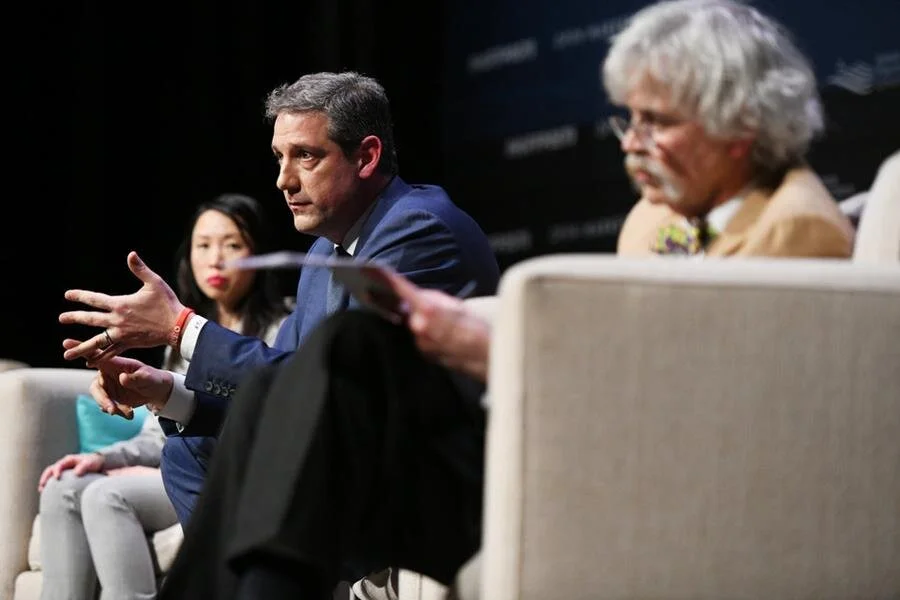Enforcers and policymakers should pay particular attention to FTC Commissioner Rohit Chopra’s powerful dissenting statement. Chopra condemned the Facebook settlement, writing, “This framework does not protect the public — it protects Facebook” and “ratifies Facebook’s governance structure instead of changing it.”
Read MoreThis week, livestock farmers and advocacy groups from across the country flew to Capitol Hill to share stories of exploitation by large meatpackers and call for greater farmer protections. At issue is a pending rule by the USDA that will clarify farmers’ grounds to sue meatpackers for retaliation, discrimination, and other abusive practices.
Read MoreThe Retail Industry Leaders Association, which represents Walmart, Target, Home Depot, and other national retailers, wrote a letter to the Federal Trade Commission last week demanding that the FTC examine “persistent oligopolies in other parts of the retail ecosystem.”
Read MoreWalmart sells 50 percent or more of all groceries in one in every ten metropolitan areas and nearly one in three “micropolitan” areas across the country, according to a report by the Institute for Local Self-Reliance, out last week. In 38 of these regions, Walmart sells 70 percent or more of all groceries.
Read MoreOpen Markets Food & Power reporter Claire Kelloway covers the story of a new law in Maine granting loggers and haulers the right to bargain collectively with forest owners and sawmills. Maine’s new law expands the antitrust exemption for farmers’ cooperatives to include loggers and haulers. Yet the need for the exemption reveals a much deeper question about how we interpret antitrust laws and who is, and is not, allowed to economically cooperate.
Read MoreLast Thursday, the Justice Department (DOJ) sued to prevent printing giant Quad from acquiring its main competitor, LSC Communications. The $1.4 billion deal between “the two most significant magazine, catalog, and book printers in the United States,” the DOJ’s Antitrust Division wrote in its complaint, “threatens to increase prices, reduce quality, and limit availability of printed material that millions of Americans rely on to receive and disseminate information and ideas.”
Read MoreLast week, several senators called on the USDA to stop giving federal trade-related farm aid to foreign-owned corporations, particularly Brazil’s JBS, the largest meatpacker in the world. This follows a bill by Congresswoman Rosa DeLauro, D-Conn., that would require USDA’s Agricultural Marketing Service to only purchase foods from American companies, when available. Read the latest story by Open Markets Food & Power reporter Claire Kelloway on how the debate around foreign corporations receiving federal contracts misses the larger question of whether or not these contracts will trickle down to farmers at all.
Read MoreIn a recent interview, Facebook COO Sheryl Sandberg deployed a talking point that other platform monopolists are increasingly using. Don’t break up Facebook, she said, because that will just allow Chinese companies to come in and fill the void. What’s wrong with this argument? It presents a false choice.
Read MoreA recent study documenting consolidation and specialization in Alaska’s fisheries over the past three decades illustrates a broader trend taking hold in coastal communities across the country. Catch share programs, a new fisheries management system, are turning fishing rights into tradable commodities, driving up the cost to fish and consolidating fishing rights into the hands of a few wealthy owners.
Read MoreIn a 5-4 decision Monday, the Supreme Court ruled that iPhone users could bring a class action lawsuit against Apple alleging that it monopolized the sale of apps. In his surprising majority opinion for the Court, Justice Brett Kavanaugh, joined by the four more liberal Justices, reaffirmed antitrust law’s longstanding purpose of protecting the producer of a good or service from the power of monopolies. This was in sharp contrast to most recent practice, in which enforcers and the judiciary have focused largely on harms to consumers.
Read MoreIn a recent letter to government regulators, the National Black Farmers Association (NBFA) argues that the proposed $66 billion takeover of SunTrust by BB&T will harm “rural and economically disadvantaged areas.” In the letter, the NBFA said the takeover will result in fewer rural branches, less competition in the regions where many of their members farm, and cuts in staff and services, particularly those dedicated to anti-discrimination compliance oversight.
Read MoreAn influential federal appellate judge last week expressed great concern about the growing power of tech platforms, including Google and Facebook, and said that anti-monopoly enforcers and courts may have been “too hasty” in abandoning two key traditional tools of antitrust law – the essential facilities doctrine and predatory pricing law.
Read MoreOpen Markets Food & Power reporter Claire Kelloway covers the story of a class-action lawsuit by the Ranchers-Cattlemen Action Legal Fund (R-CALF) alleging that dominant meatpackers conspired to depress cattle prices starting in 2015. The case argues that JBS, Tyson, Cargill, and National Beef strategically cut back on open market cattle bids, closed plants, and imported costly foreign cattle in order to force farmers to accept lower prices and manipulate spot market cattle values.
Read MoreOpen Markets' reporter Claire Kelloway writes about the nation’s fourth-largest beef packer National Beef's plans to take over Sysco-owned Iowa Premium, a regional packer focused on processing black angus steers for the Upper Midwest and how this merger threatens America’s last competitive cash cattle market.
Read MoreLast Saturday, five Democratic Party presidential hopefuls gathered at an event in Storm Lake, Iowa to present their platforms for revitalizing America’s farms and rural communities. Co-sponsored by the HuffPost, Iowa Farmers Union, Open Markets Action, and The Storm Lake Times, the Heartland Forum received wide coverage in the press, most of it focused on how all the candidates called for much stronger enforcement of antitrust laws against the corporations that dominate agricultural and food systems.
Read MoreLast week, the U.K. government and the House of Lords each released long reports detailing some of the growing threats that platform monopolies like Facebook, Google, and Amazon pose to individual citizens, businesses, and overall society. Unfortunately, both reports failed to provide a plan to deal effectively with the problem.
Read More

















